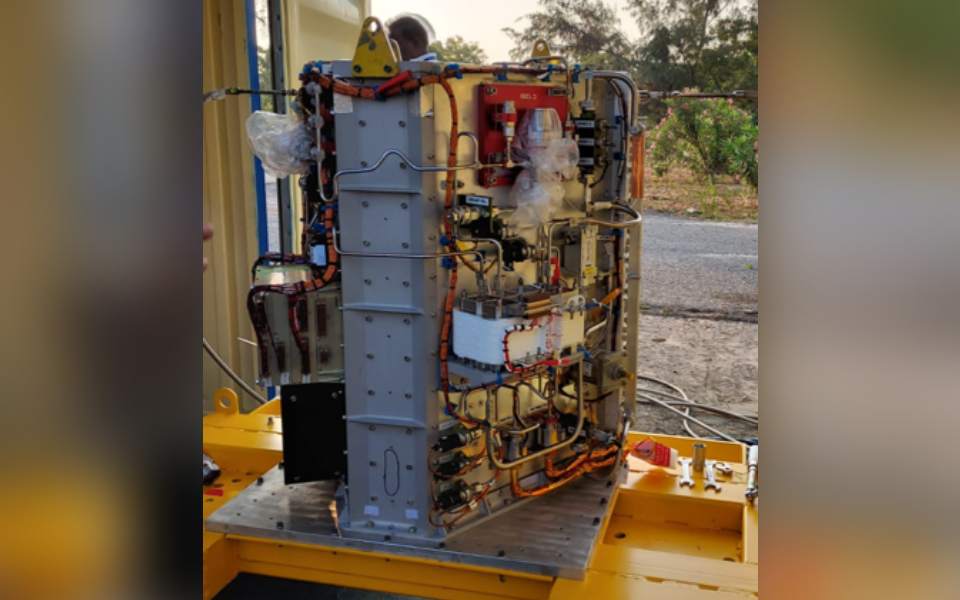Bengaluru, Jan 5: ISRO on Friday said that it has successfully flight-tested a fuel cell to assess its operation in space and to collect data to facilitate the design of systems for future missions.
Powering missions with efficiency and emitting only water, these fuel cells are the future for power production in space habitats, the national space agency headquartered here said.
Vikram Sarabhai Space Centre/ISRO successfully tested a 100 W class Polymer Electrolyte Membrane Fuel Cell based Power System (FCPS) in its orbital platform POEM3, launched onboard PSLV-C58 on January 1.
"The objective of the experiment was to assess Polymer Electrolyte Membrane Fuel cell operation in space and to collect data to facilitate the design of systems for future missions," ISRO said in a statement.
During the short duration test onboard POEM, 180 W power was generated from Hydrogen and Oxygen gases stored onboard in high pressure vessels.
"It provided a wealth of data on the performance of various static and dynamic systems that formed part of the power system and the physics at play," the space agency said.
Hydrogen fuel cells produce electricity directly from Hydrogen and Oxygen gases, along with pure water and heat. It is an electric generator which works on electrochemical principles, as in batteries, as against the combustion reactions employed in conventional generators, it was noted.
The ability to produce electricity directly from fuels without any intermediate step renders it very efficient. With water as the only byproduct, they are totally emission-free. These features make them ideal candidates for space missions involving humans where electric power, water and heat are essential, since a single system can meet multiple requirements in the mission, according to ISRO.
Fuel cells also possess significant societal application potential. They are also considered to be the most appropriate solution to replace the engines of various types of vehicles in use today and to power standby power systems.
They can provide a range and fuel recharge time equaling that of today's conventional engine, which gives them a distinct advantage over batteries, and are expected to facilitate emission-free transportation.
Fuel cell is an ideal power source for the space station as it provides both power and pure water, ISRO added.
POEM-3 on PSLV-C58:
— ISRO (@isro) January 5, 2024
VSSC/ISRO successfully tests a 100 W class Polymer Electrolyte Membrane Fuel Cell on PSLV-C58's orbital platform, POEM3.https://t.co/f5SGqh1ZUR
Powering missions with efficiency and emitting only water, these fuel cells are the future for power production in… pic.twitter.com/lCbsZF9UIB
Let the Truth be known. If you read VB and like VB, please be a VB Supporter and Help us deliver the Truth to one and all.
Kalaburagi: Four men have been arrested in Kalaburagi on charge of hacking a man with lethal weapons and pelting stones at him under the limits of Station Bazaar Police Station recently.
According to police sources, Anand Jalak Shinde (34), Ashitosh Jalak Shinde (30), Imran Mehboob Sheikh (28) and Sohaib Anwar Qureshi have been arrested. The men are accused of the brutal murder of Syed Mehboob, a resident of Station Bazaar Upper Line Hamalawadi in the city.
An FIR was filed by the Station Bazaar Police Station based on a complaint given by Syed Ismail, father of the deceased Syed Mehboob.
Following quick probe, the police team successfully arrested the suspects within 24 hours. The arrested men were produced in court and have been sent to judicial custody.
The City Police Commissionerate has appreciated in an official release the police team’s quick solving of the murder case and arrest of the four men accused of murdering Syed Mehboob.





